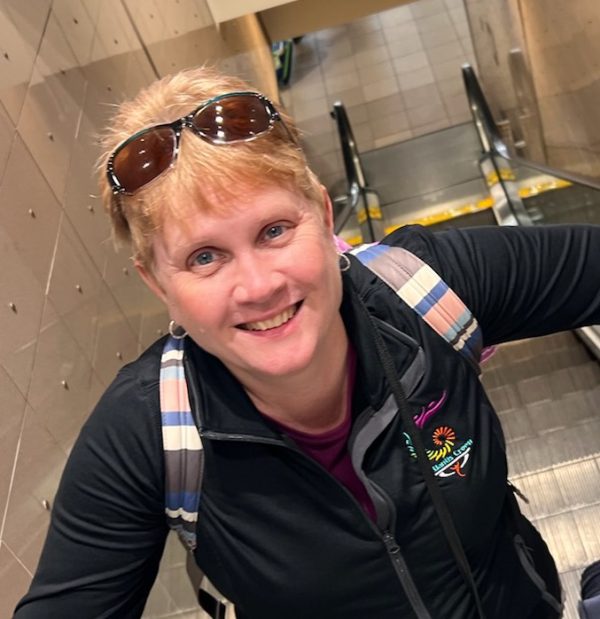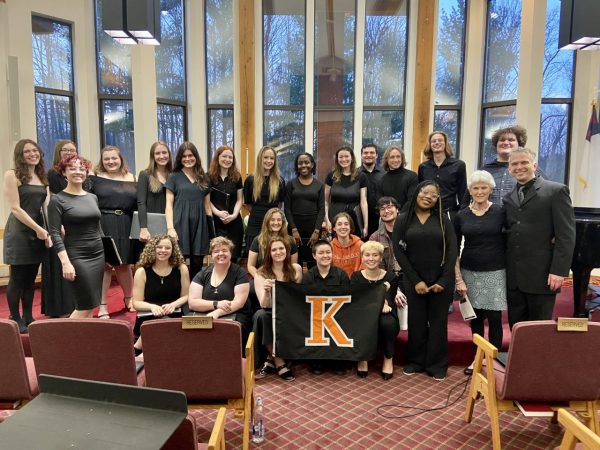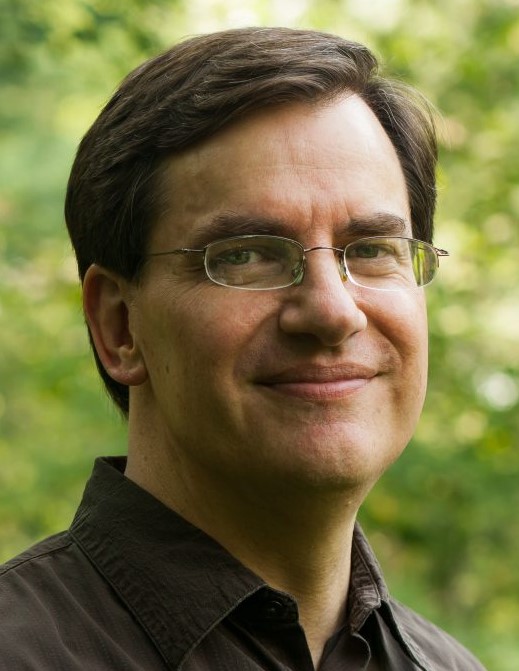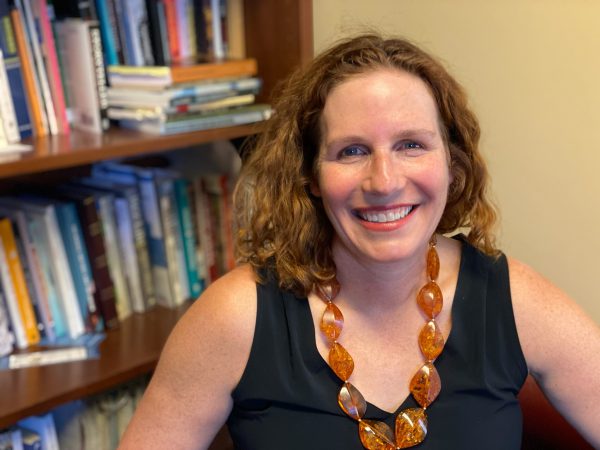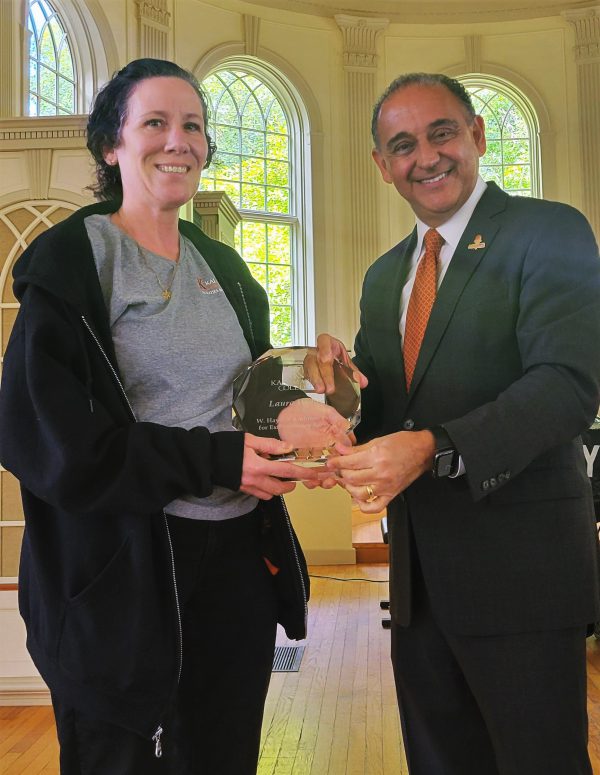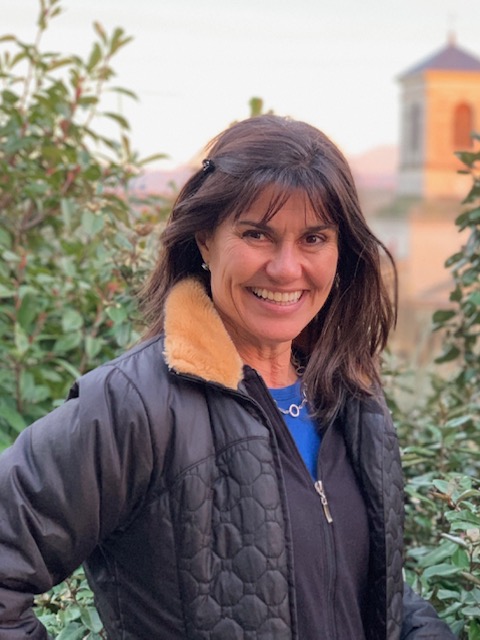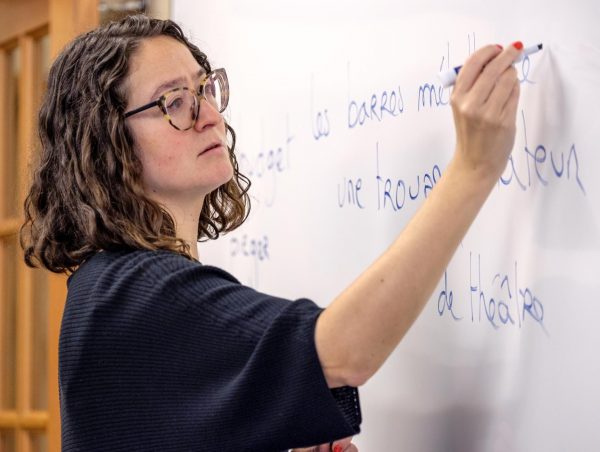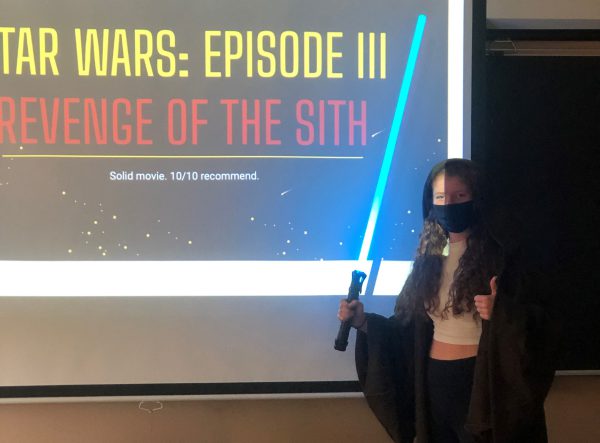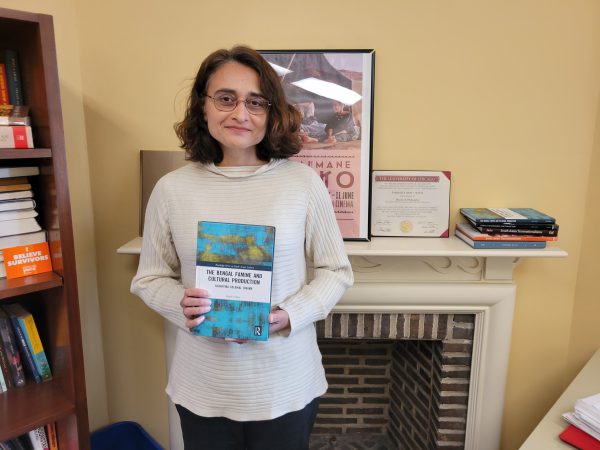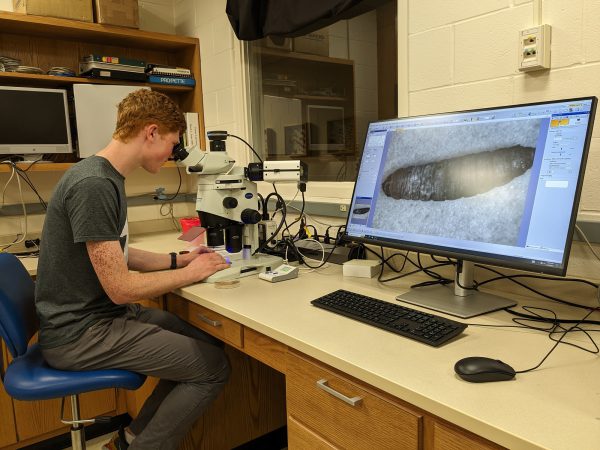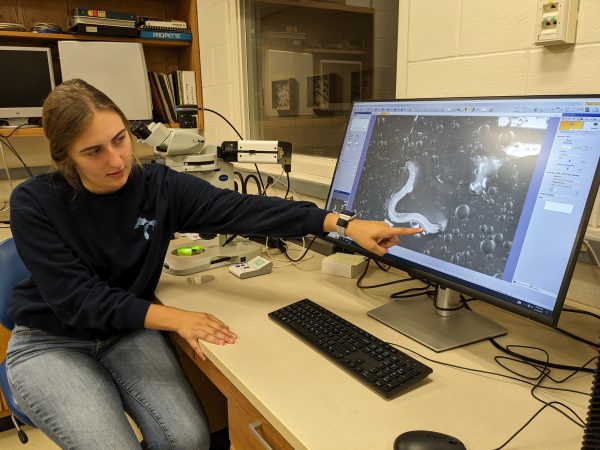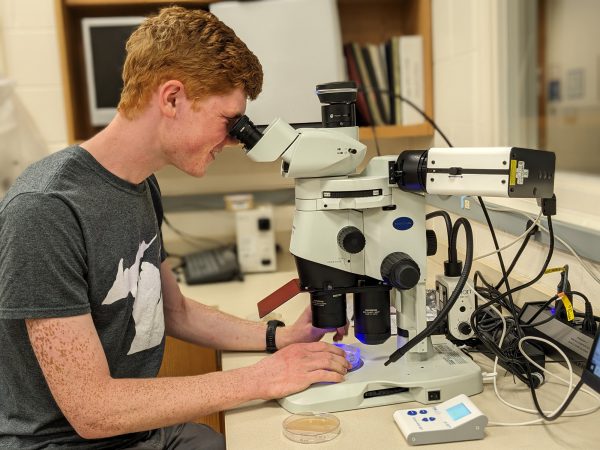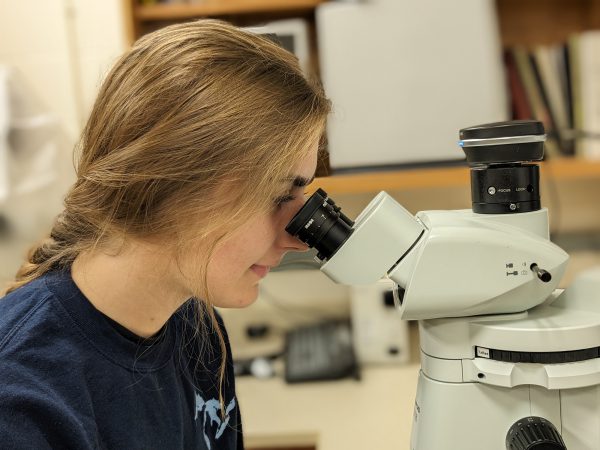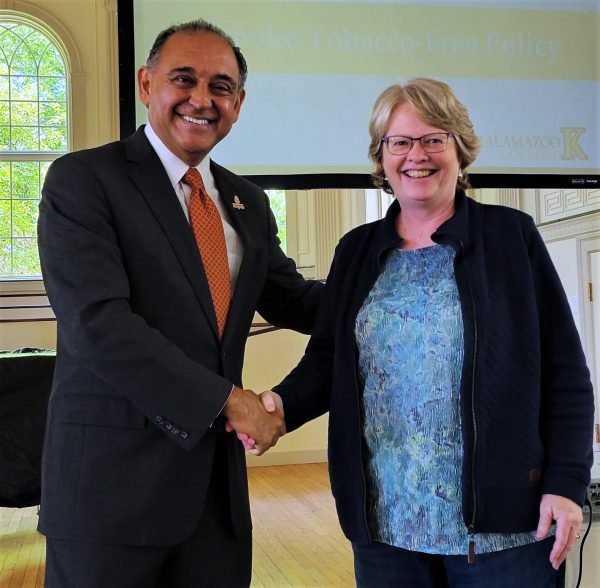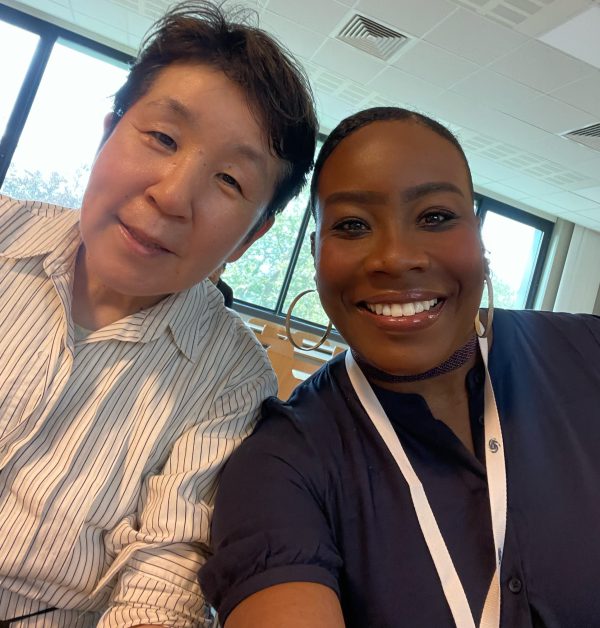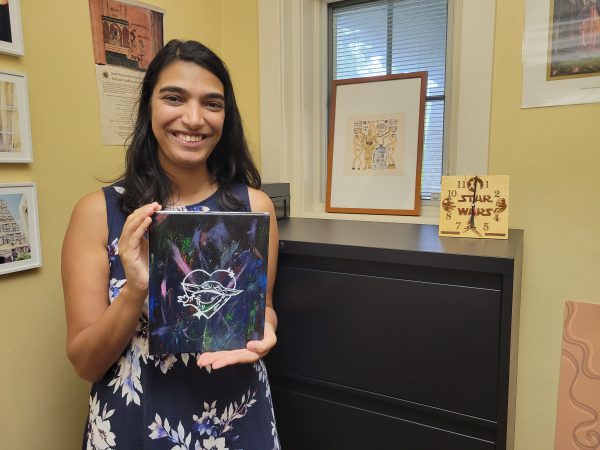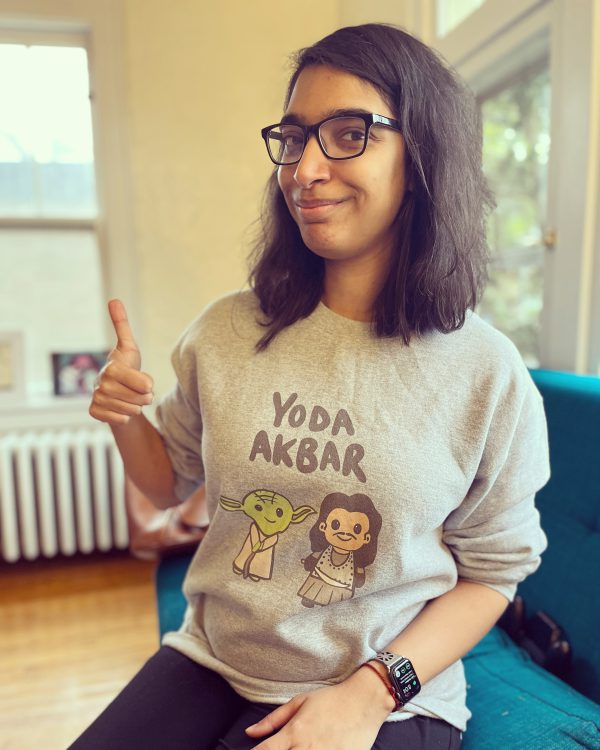A National Science Foundation grant for almost $250,000 is boosting inclusivity and access to lab experiences in the Kalamazoo College Department of Chemistry and Biochemistry.
Assistant Professor of Chemistry Daniela Arias-Rotondo, known around campus as Dr. DAR, was awarded $249,972 under the foundation’s Launching Early-Career Academic Pathways in the Mathematical and Physical Sciences (LEAPS-MPS). The LEAPS-MPS grant emphasizes helping pre-tenure faculty at institutions that do not traditionally receive significant amounts of NSF-MPS funding, including predominantly undergraduate institutions, as well as achieving excellence through diversity.
Arias-Rotondo will use the grant funding primarily to pay her student researchers—typically eight to 10 per term, known as DARlings—and to bring more research experiences into the classroom.
While the chemistry and biochemistry department is typically not able to pay students to work in the lab during the school year, “This grant lets me do that, so my students can work in the lab instead of having to take another job on or off campus,” Arias-Rotondo said. “That’s a great way to ensure that more people can have access to this experience, as opposed to only the people who have free time they can volunteer.”
The grant will also pay students who work in the lab over the summer (usually four or five), freeing up departmental and College funding that would normally pay those stipends.
“Not having to pay those four or five students through the provost’s office or the chemistry and biochemistry department means we will have money for other students to do research with us here in our department, or maybe in biology or physics, so that benefits not just my group, but the department and the College as a whole.”
The other primary focus of the grant is a re-design of the lab portion of the inorganic chemistry course CHEM 330.
“While we have some good lab courses here in our department where students get to learn a lot of techniques and a lot of concepts, many of those lab experiences are what we call canned experiments, meaning that they are not open ended,” Arias-Rotondo said. “You are making X compound, or you’re running Y experiment, and we know what you’re going to get in the end. We have some courses where we do more open-ended labs, which the students tend to enjoy more because there’s more of the unknown and problem solving. It’s very transformative because it shows you a different side of chemistry.”
Inspired by the work of colleagues in the department, particularly Dorothy H. Heyl Professor of Chemistry Regina Stevens-Truss, Arias-Rotondo has been able to use the grant to revamp the lab for CHEM 330, inorganic chemistry, to more closely resemble research.
“That’s really good for the students,” Arias-Rotondo said. “It’s more work, but it’s also more rewarding, because now they are doing things that are new, and they are making molecules that no one made before.”
Providing access to lab experiences for more students at K truly changes lives.
“It gives them the opportunity to see what research is really like,” Arias-Rotondo said. “It also gives them a challenge that is theirs. I’ve seen students who were very unsure of what to do—not because they are not good, but because they’ve never had the opportunity to prove themselves—and you give them this task. You support them, you tell them, ‘This is hard, but I trust that you can do it,’ and they rise to the challenge. It’s amazing to see the transformation in them. They learn a lot about chemistry. They learn a lot of techniques. They get a better idea of what a career in research could look like. And they learn a lot about themselves, about asking for help and working independently, but also working as part of a team, about troubleshooting, and they gain a lot of confidence.”
Working in a lab also increases students’ sense of belonging.
“They make friends,” Arias-Rotondo said. “They meet people within our department, further ahead or behind, depending on who they are. They meet more professors and students, and they feel more a part of the department, even before they declare their major. They’re like, ‘Oh, this is my place. These are my people.’ And it helps them see themselves as scientists.”
In addition to paying student researchers and improving lab coursework experiences, the grant is paying for supplies in Arias-Rotondo’s lab, where she and her DARlings work on making compounds that can absorb solar energy and turn it into electricity using manganese, a low-cost, low-toxicity alternative to the materials currently used in solar energy conversion, which tend to be rare, expensive and difficult to mine.
The grant will also provide a summer salary for Arias-Rotondo’s research, help fund travel for students to attend conferences and share their results, and potentially purchase or update small instruments for the lab.
Arias-Rotondo applied for the LEAPS-MPS grant in January 2023, with the help of Director of Grants, Fellowships and Research Jessica Fowle and colleagues in the chemistry department.
“Jess is amazing; I don’t think I could have done this without her,” Arias-Rotondo said. “I also had a lot of support from my department with writing, reading drafts, giving feedback.”
In August, she learned she had been awarded the grant, and it started Sept. 1. Arias-Rotondo has two years to spend the money, with an option to extend it to a third year if needed.
“It’s just under a quarter million,” Arias-Rotondo said. “Sometimes I can’t believe that anyone would trust me with that. I say this because a lot of times, I look around and think, ‘Who thought that I could do this?’ It’s a dream come true, and this grant is amazing, but it’s also like, ‘Wow, someone thought that I could do it.’
“A lot of times students don’t trust themselves. Imposter syndrome is a real thing, and students look at me and think, ‘Oh, she’s got it. Professors know what they’re doing.’ It’s important to me to let people know that’s not true. It’s not like one day your feelings of inadequacy just lift off, and now you feel so confident that everything is great. You keep having doubts. I care about letting them know that, so if they get to grad school, or they get their Ph.D., or whenever, and they still feel like they are faking it, they still feel like they are not good enough, they know that doesn’t mean that they are not good enough. That’s just the way our brains work. You can be great and still feel like you’re not. I keep talking about that because it’s important to normalize it.”
Experiences like those afforded by the LEAPS-MPS grant go a long way toward building students’ confidence in themselves.
“I’m really excited for all the things that this grant is doing for students,” Arias-Rotondo said. “It gives them a lot of opportunities. You can see how excited they are when they present posters, or when they talk about research with their friends, not just learning chemistry, but also self-confidence that they can do hard things. You can see the progression. It doesn’t matter how good they were when they started. At the end of it, they are so much tighter with each other, they have learned so much, and they are so much better.”



